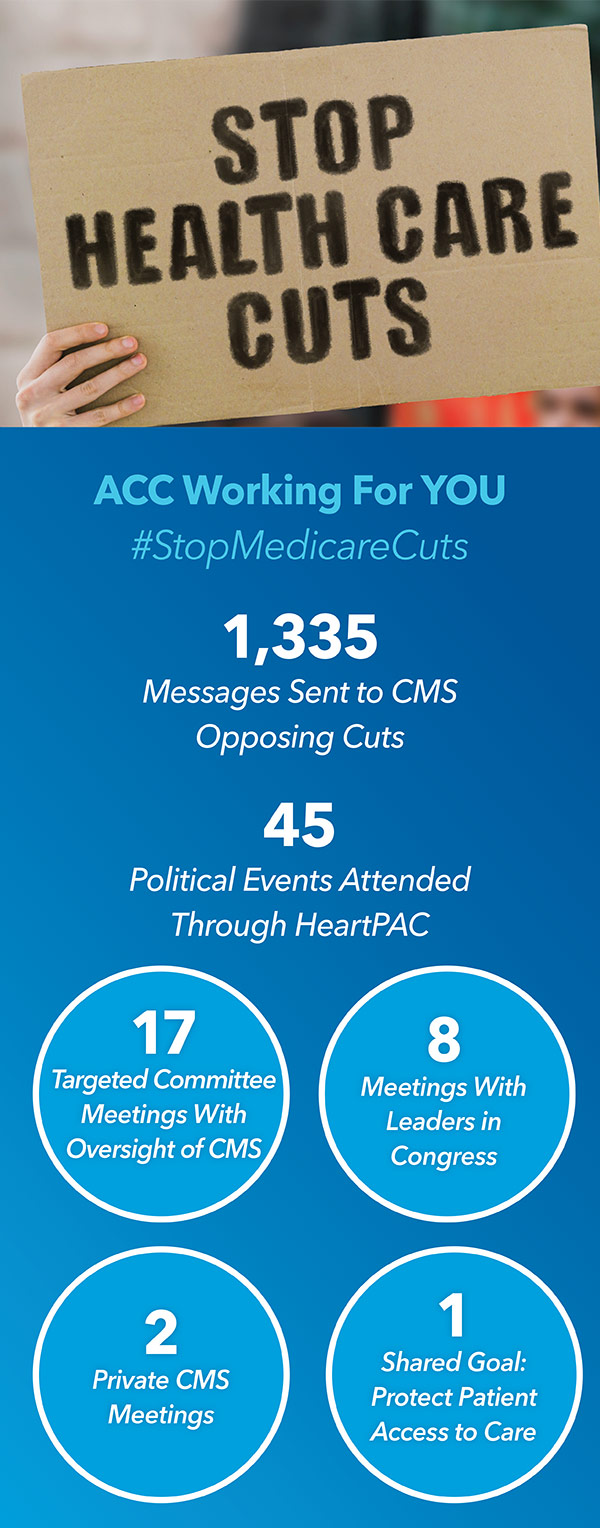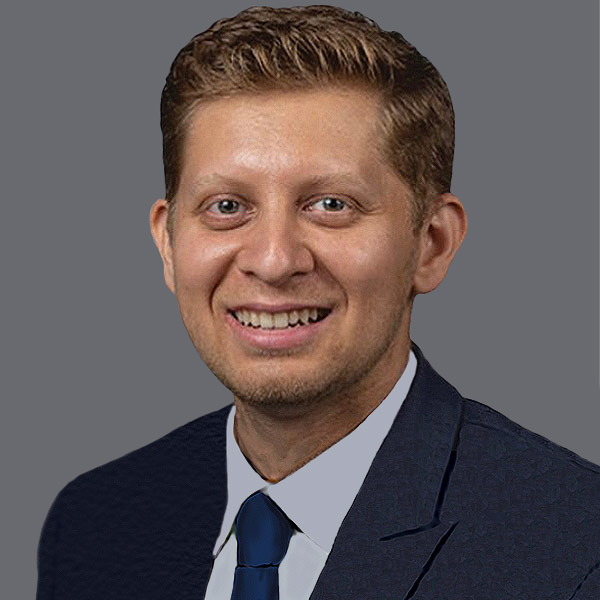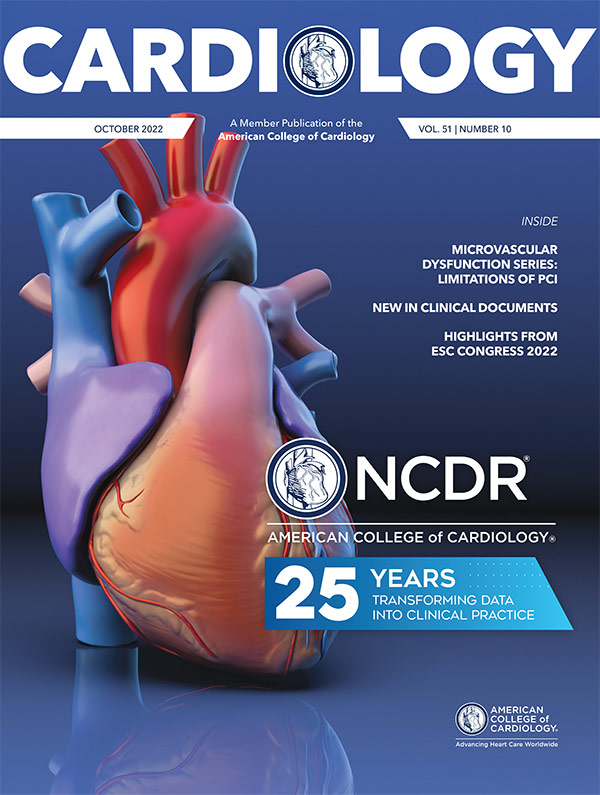Heart of Health Policy
ACC to CMS: Stop the Cuts

In formal comments submitted to the Centers for Medicare and Medicaid Services (CMS) last month, the ACC took on the egregious cuts to reimbursement for cardiac ablation services that were included in the 2023 Medicare Physician Fee Schedule (PFS) Proposed Rule.
As part of the PFS, CMS' proposed changes to work relative value units (RVUs) for cardiac ablation services, endovascular pulmonary arterial revascularization and pulmonary angiography code sets that were well below the recommendations of the Relative Value Scale Update Committee (RUC). Since the release of the proposed rule, ACC staff and member leadership have been working tirelessly – often in conjunction with partner cardiovascular societies like the Heart Rhythm Society (HRS) and Society of Cardiovascular Angiography and Interventions – to combat these significant reductions in service value.
To date, a large-scale grassroots campaign in close collaboration with HRS has resulted in hundreds of emails to CMS from clinicians across the U.S., helping to amplify these efforts. Additionally, nearly a dozen meetings have been held with members of Congress and/or their staff to enlist their help to stave off these cuts. The College has also met with CMS staff directly to fully explain ACC's concerns. These and other ongoing cuts will be part of discussions with members of Congress during ACC's Legislative Conference.
Outside of the reductions in cardiovascular services, the formal comment letter also addressed the following provisions included in the proposed PFS:
- Support for the continuation of direct supervision of cardiac rehabilitation being allowed via real-time audio-visual telecommunication technology following the Public Health Emergency (PHE). This allowance is currently set to expire 151 days after the end of the PHE.
- Support for the delay of removing medical decision making (MDM) as a factor to determine billing of split-shared E/M codes; with comment that MDM should be reinstated as a determining factor going forward. As proposed, this change would take effect in 2024 and redefine the definition of substantive portion as more than half of the total time.
- Request to delay proposed changes to the Medicare Economic Index, which would have shifted resources away from physician payment towards practice expense and other nonphysician payment costs until additional data are available – specifically the American Medical Association's upcoming Physician Practice Information Survey.
- Support for proposed expansion of dental care to improve care of cardiac valve patients.
- Support for proposed advanced payments under the Shared Savings Program to Accountable Care Organizations (ACOs) in underserved areas/communities as well as expansion of ACO eligibility criteria to allow lower revenue ACOs to participate.
- Support for additional quality measures to the Advancing Care for Heart Disease MVP, with the exception of Preventative Care and Screening: Screening for Depression and Follow-Up Plan, and Risk-Standardized Acute Unplanned Cardiovascular-Related Admission Rates for Patients with Heart Failure. ACC also continues to have concerns with costs measures.
- Comments in response to CMS' request for information to evaluate and implement initiatives in reducing disparities, particularly in measuring healthcare disparities and future efforts in reducing disparities.
Get Involved With ACC Advocacy
ACC's Advocacy efforts are focused in four core areas – Congressional Affairs, State Government Affairs, Regulatory Affairs, Payer and Care Delivery Policy – and are driven by the following overarching policy priorities:
- Reduce administrative burden and promote clinician well-being
- Lead the transition to improved care models that strengthen value and patient outcomes
- Promote practice stability and patient access to affordable care
- Optimize cardiovascular care, outcomes and health
- Advance member engagement and leadership
Click here to learn more about the work being done across all four areas and opportunities to get involved.
ACC Legislative Conference 2022: What You Need to Know
Every October, ACC's annual Legislative Conference brings together hundreds of cardiovascular care clinicians from across the U.S. for a focused opportunity to learn more about high priority health policy issues before Congress, as well as a chance to meet directly with members of Congress and/or their staff teams to provide firsthand insights into what it means to be on the front lines of care delivery.
This year is no different, with focused discussions planned around hot-button issues like ongoing cuts to physician reimbursement, including significant cuts to EP ablation. Visit ACC.org/LegislativeConference for the complete agenda, and to download briefing materials and more! Register to be a part of it from Oct. 16-18.
Also, check out ACC.org/ACCPresident for the latest UnEDited discussion featuring ACC President Edward T.A. Fry, MD, FACC, and special guests discussing some of the broader societal issues like COVID-19, health equity and maternal health and the College's role in providing clinical guidance, advocacy and more.
Why Do We Need Advocacy in Medicine?
"Hey, Mrs. Johnson, it's good to see you again. We'd discussed performing a stress test at our last appointment. What happened?"
"Doc, I'm so sorry. I came in for the test and they asked me for $2,000. I don't have that kind of money."
If this is not a regular occurrence in your practice, you likely practice outside of America. The financial burden of health care in the U.S. that our patients are carrying is unsustainable at its current dizzying pace. Navigating copays, deductibles, in/out of network coverage, hidden costs and surprise bills associated with every visit and test would make any sane individual avoid seeing their physician and delay much needed care.
Simultaneously, health care clinicians continue to experience an alarming toll of burnout, with administrative burden one of the most common factors cited. There has also been a sea change in practice models over the past couple of decades, with the share of physicians in private practice dropping below 50% for the first time ever in 2020, according to a biennial analysis of physician practice arrangements by the American Medical Association.
The continuation of shifts toward larger medical practices and health systems and away from physician-owned practices undoubtedly has accelerated during the COVID pandemic. Factors contributing to this shift include change in practice size, mergers/acquisitions and practice closures, as well as the economic impact of the pandemic. All these factors have led to major fractures in the sacred doctor-patient relationship.
So, the next questions are what can we do and where do we begin to address these major fault lines in our profession?
Change will not come overnight; it is always incremental. It must start with each of us identifying our areas of passion and investing time and resources towards these causes. Participating in grassroots causes at your local institution or in your community is a great start. It is vital to take active leadership roles, and to use our voices to address organizational and policy changes at our home institutions.
We can advocate for an adequate supply of PPE for all health care workers, resources for mental health counseling, adequate compensation and sick leave, and protection against verbal and physical abuse in the workplace. Promoting a culture of acceptance and equity that recognizes and addresses undue bias due to race, gender and sexual orientation can help improve and promote clinician well-being and go far in addressing burnout.
On a macro-level, political activism cannot be sidelined either. ACC offers many opportunities beginning at the level of Fellows in Training to get involved in advocacy. My first Legislative Conference as a cardiology fellow piqued my interest. During the congressional visits, I realized that I did not need any particular skills to "lobby." I had patient stories, my experiences as a physician and lessons from my fellow colleagues – all of which I could use to make connections with members of Congress. We discussed the hours spent on prior authorizations and pointless peer-to-peer reviews. We also addressed the higher incidence of cardiovascular disease among South Asians and asked for increased funding for research in this area.
In addition to the annual Legislative Conference, ACC's weekly Advocate newsletter is a good way to stay informed about the College's current efforts in advocacy and different ways to get involved. You can also stay on top of latest news, health policy principles, calls to action and learn more about the ACC's HeartPAC at ACC.org/Advocacy.
Feeling jaded by the current inadequacies and disparities in our profession cannot be an option. We cannot sit on the sidelines. Rather, we must leverage our expertise and power to address needs of marginalized patients and fellow clinicians and work towards building a system where activism can be integrated into everyday medicine. In the ideological yet inspirational words of former President Obama: "Change will not come if we wait for some other person or some other time. We are the ones we've been waiting for. We are the change that we seek."

This article was authored by Rohan T. Mehta, MD, FACC, a general cardiologist at Baylor Scott and White in Killeen and Temple, TX, and a member of ACC's Early Career Member Section. Twitter: @rohan900.
Keywords: ACC Publications, Cardiology Magazine, ACC Advocacy, Legislative Conference
< Back to Listings

